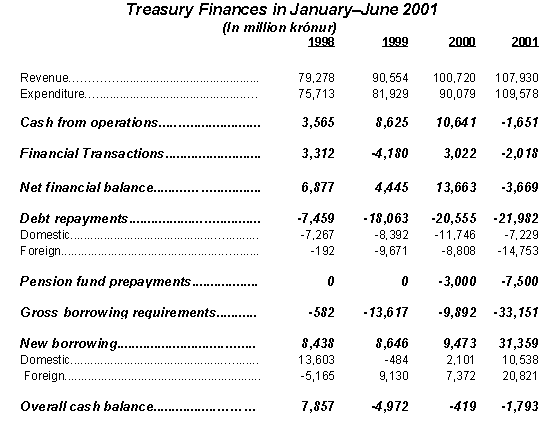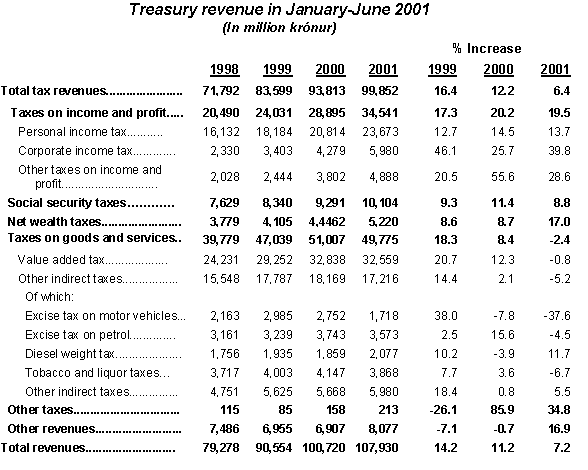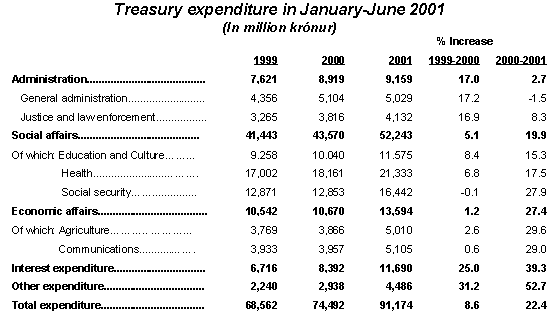Treasury finances January-June 2001. Report date July 25, 2001
Treasury Finances, January-June 2001
Report date July 25, 2001
Figures for Treasury finances in the first six months of the year 2001 are now available. They are presented here on a cash basis and are, therefore, not comparable to the Treasury accounts or the fiscal budget, both of which are presented on an accruals basis.
Summary
The cash deficit from operations amounted to close to 1.7 billion krónur in the first six months of the year, compared to a surplus of 10.6 billion krónur last year. This outcome is almost 5.8 billion krónur below budget projections. Revenues exceed projections by about 1 billion, whereas expenditures surpass projections by 6.8 billion krónur, mostly due to new legislation, wage agreements etc.
Revenues increased by 7.2 billion krónur from last year, due mostly to an increase in income tax collection. The increase in expenditures was considerably larger, and amounted to about 19.5 billion krónur. In addition to the aforementioned, this increase is mainly attributable to rising interest costs, government purchases of farm production quotas and a special increase in contributions to the Municipal Equalization Fund. It should be noted that a part of this increase will not affect the accounts on an accruals basis.

The net financial deficit amounted to 3.7 billion krónur, which is an outcome that is 6.4 billion krónur below projections and 17 billion krónur worse than last year}s. In addition to the expenditures mentioned above, the larger deficit this year is due to the fact that in the year 2000 the Treasury received a one-time payment of 5.5 billion krónur for the sale of shares in the two state-owned commercial banks. These sales actually took place towards the end of the year 1999 but payments were made in early 2000.
A total of 7.5 billion krónur were paid to the Government Employee Pension Fund in the first six months of this year. The purpose of this is to reduce the Treasury}s future commitments to the Fund. In all 15 billion krónur are allocated to this in the 2001 fiscal budget.
The overall cash deficit in the first six months of the year amounted to 1.8 billion krónur, which is 1.4 billion krónur larger than last year}s deficit in the same period.
Revenue
The Treasury}s total revenues amounted to 107.9 billion krónur in the first half of this year, exceeding projections by about a billion. The increase from last year is 7.2 billion krónur, or 7 per cent. Tax revenues have increased a little less, or by 6S per cent, compared to 12 per cent last year and 16S per cent two years ago. These numbers reconfirm the trend of declining growth in domestic demand, especially this year.

The increase in revenues from last year is largely due to an increase in both personal and corporate income taxes and in capital income taxes. There are, however, some temporary factors leading to this outcome, the effects of which will decline in the next few months. For example, the increase in personal income tax revenues is largely due to a wage increase based on wage agreements in 2000 plus an additional increase in 2001. In addition, wage agreements have yet to be concluded with some government empoyees. In total, taxes on wages and profits and social security taxes are 5 billion krónur over projections in the first half of the year. Net wealth taxes are, on the other hand, according to projections.
The slowdown in the economy is clearly reflected in the development of indirect taxes. Revenues from indirect taxes are over a billion krónur lower than over the same period last year and 4 billion krónur below projections. This development reflects a considerable contraction in real terms, or about 8 per cent. This is mostly due to a substantial decline in private consumption, especially vehicle purchases, with excise taxes on motor vehicles have declining by around 40 per cent, or by 1 billion krónur. This slowdown is also reflected in declining revenues from value-added taxes, which have practically remained unchanged in nominal terms since last year.
Expenditure
The Treasury}s total expenditure amounted to 109.6 billion krónur in the first half of the year, which is 6.8 billion over projections. This is largely due to new legislation and wage agreements as already mentioned, e.g. a one-time payment of 1.3 billion krónur in disability pensions following a Supreme Court verdict, and 1.3 billion krónur in interest payments due to the early redemption of domestic government bonds. Expenditures increased by 19.5 billion from last year due to several causes listed in the summary above.

Administrative expenditures, which include the Presidency, the Cabinet, the Althingi, the courts and law enforcement, decreased slightly from last year. This is due to the fact that last year}s expenditures included non-recurring expenditures connected with the Christianity millenium celebrations and to a decline in allocations to maintenance operations. The increase in law enforcement expenditures is a mere 250 million krónur, with lower allocations to avalanche prevention this year partly offsetting general wage and price increases.
Social affairs. Close to 60 per cent of expenditures over this period went to various social affairs, including education, culture, health and social security. Expenditures in this category rose by 10.9 billion krónur from the previous year. Expenditures for education rose by 2 billion krónur, a substantial part of which is due to the moving up of payments to the Student Loan Fund, or about 550 million krónur. It is foreseen that the Fund}s loans will increase in excess of projections because of the decline in the Icelandic króna exchange rate. Payments to education increased by 720 million krónur, which is partly explained by overtime payments to teachers following the teacher}s strike at the secondary school level and, subsequently, pay increases according to new wage agreements. Expenditures to cultural affairs increased by 360 million krónur, or 8.5 per cent.
Health expenditures increased by 4.3 billion krónur, of which 1.3 billion is explained by payments to the Social Security Administration to improve its cash balance. Last year the outlays of the Social Security Administration increased faster than the Treasury appropriations it received, thus creating a cash deficit which is being offset this year. Operational expenditures of hospitals and nursing homes increased by 1.6 billion krónur, or about 13 per cent. Most of this increase, or 1.4 billion, went to the large hospitals in Reykjavík and Akureyri, but payments to other hospitals increased by 250 million. Proportionally, the largest increase, a total of 1 billion, or 30 per cent, went to nursing and rehabilitation centers. This is for the most part in line with projections.
Social security increased by 4.1 billion, or 27.4 per cent. Pensions to senior citizens and social welfare expenditures increased by 2.6 billion. This is mostly due to the Supreme court verdict mentioned above, but 500 million krónur is due to a transfer to improve the cash balance of the Social Security Administration. Parental leave benefits in pursuance of the new Parental Leave Benefit Act have led to a 820 million krónur expenditure so far this year. Outlays to the Unemployment Insurance Fund increase only slightly, or about 200 million króner, since the unemployment rate is only 1.5 per cent, compared to 1.9 per cent during the same period last year.
Economic affairs. Expenditure on communications increased by 1.3 billion, of which 800 million krónur went to roadbuilding and maintenance and 300 million to harbours. Special items included government purchases of farm production quotas which entailed a 780 million krónur payment in January. Contributions to the Institute of Regional Development increased by almost 100 million krónur.
Interest expenditures increased by 37.7 per cent or 3.4 billion krónur, 1.8 billion of which is due to the redemption of a large government bond issue in February and 1.5 billion krónur is due to interest payments on foreign debt.
Other expenditures increased by almost 1.9 billion krónur for two reasons. The first is a 300 million krónur increase in the contributions to the Municipal Equalization Fund, and the second is a 500 million krónur increase in payments to the Government Employee Pension Fund.
Capital transactions
The outflow of financial transactions amounted to 2 billion krónur in the first half of this year, compared to 3 billion for the same period last year. The difference is largely due to the received payment of 5.5 billion in January of last year because of the above-mentioned sales of shares in state-owned commercial banks.
Repayments of Treasury debt amounted to 22 billion, nearly all due to the repayment of a foreign government loan. A large domestic bond issue from 1990 matured in February and the redemption amounted to 8.8 billion krónur, of which 4.8 billion were repayments of principal, the remainder being accumulated interest. Furthermore, three domestic government bond issues were redeemed before maturity through a purchase auction for 3.6 billion, of which 2.2 billion were repayments of principal. Auctions of this kind are directed towards government bond issues that lack liquidity in the secondary market.
The Treasury remitted 7.5 billion krónur to the Government Employee Pension Fund, as noted above, compared to 3 billion in the same period a year ago.
Treasury borrowing amounted to 31.4 billion krónur, 20.7 billion of which was borrowed abroad in order to refinance earlier foreign debt. Domestic Treasury bills outstanding increased by 6 billion in the first six months of the year. In addition, new government bonds with a 6-year maturity were sold for about 4.4 billion krónur.
